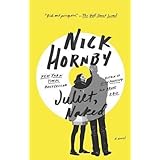“Hahahahahahahahahaha. I told you he was
overrated. Now go and listen to everything MORRISSEY has ever sung, you
muppets.”
“Nobody grew up or got bigger; no landmark occasions were
commemorated, because there were none. Duncan and Annie just got slowly older,
and a little fatter…Annie had single friends who’d never had kids, but their
holiday photos, usually taken in exotic locations, were never boring – or
rather, they didn’t feature the same two people over and over again, quite
often wearing the same T-shirts and sunglasses, quite often sitting by the same
swimming pool in the same hotel on the Amalfi coast.”
“The fact is, some of these myths are so colorful hat they
have deterred me from re-entering the world; it seems to me that people were
having more fun with me gone than they could ever have if I was around.”
With Juliet, Naked, Nick Hornby proves that he can write
about music in a world where only hipsters have record players, music stores
are going extinct, and the internet takes up most of our lives (if you’re
curious if he can write about a world without music at all, I highly recommend
you check out A Long Way Down). Juliet, Naked, follows the above-quoted couple
Annie and Duncan who are stuck. Their lives are agonizingly boring and at times
frustrating to read; frustrating mostly because I see parts of myself that I dislike and parts of
my friends that I dislike and when our lives are kind of boring we complain
lots but can’t change anything because a lot of the time life is kind of boring
– that’s why I read books to pretend that I have had a lot more interesting
experiences than I have had. The frustration is what makes the bulk of the book
– versions of Annie and Duncan are all over real life which makes them entirely
real and sympathetic.
Annie has settled for Duncan, an ok bloke who is obsessed
with Tucker Crowe, a musician who wrote one of the greatest albums of all time
and then disappeared in the middle of a tour. He is obsessive, creepy, and
sometimes lawbreaking in his need to analyze and re-analyze everything that is
known about Tucker Crowe. The Internet has saved Duncan from being a weirdo
though, because through it he can join message boards and converge with other
weirdos and find a sense of family, community, and purpose that don’t exist in
his real life.
On the other side of the
narrative voice is Annie who longs to have a richer life, but continually
chooses to settle into whatever is safe and easy. The tension between her and
Duncan rises and rises until Juliet,
Naked (the acoustic version of Crowe’s famous album Juliet) arrives on their doorstep. Duncan writes a glowing review
while Annie writes a tepid one…and Tucker Crowe sends her an e-mail.
The novel is multi-genre with
shifting narratives which are two ways an author can easily win me over.
Interspersed with the regular narrative perspectives of Annie, Duncan, and
Tucker are e-mail exchanges and message board conversations, and Hornby hits
the right voice for all of these – we don’t e-mail the way we talk and we don’t
message board the way we e-mail.
The ending is ambiguous, which is why I have
been sitting on this review for about a week – I liked it, but I don’t know how
I feel about it if that makes any sense. I just don't expect that sort of ending from the typical poplit novel, and I'm not sure if I want it. After my final day of sitting-on-the-review I have determined that with our new world we need new literature that captures it. We need books about message board communities, e-mail flirtations, long distance relationships, and artists who did one great thing and disappeared much to the disappointment of their fans, and because we don't have much of them, I'll accept this book as a successful endeavor.

No comments:
Post a Comment